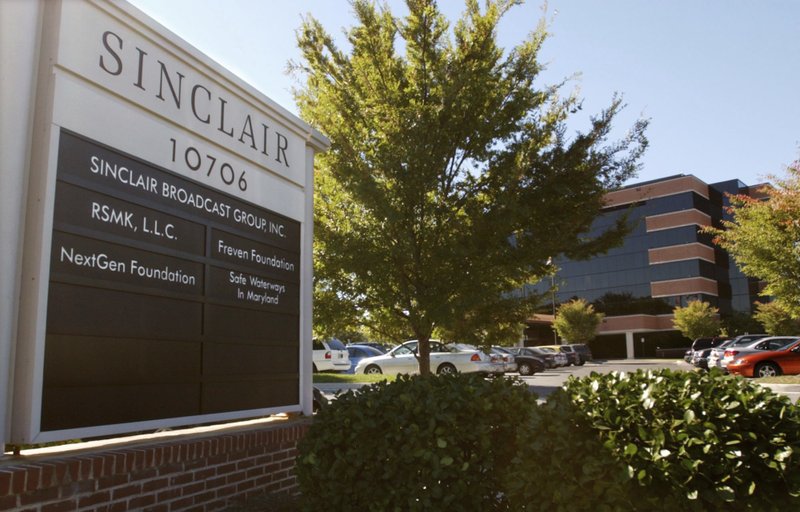NEW YORK -- Sinclair Broadcast Group, already the nation's largest local TV station operator, announced Monday that it will pay about $6.6 billion for Tribune Media's 42 stations and debt.
Chicago-based Tribune owns KTLA in Los Angeles, WGN in Chicago and WPIX in New York and has stakes in the Food Network and job-search website CareerBuilder. Tribune also owns Fort Smith CBS affiliate KFSM-TV, Channel 5.
Hunt Valley, Md.-based Sinclair has 173 stations, including Little Rock ABC affiliate KATV-TV, Channel 7, KENV in Salt Lake City, KOMO in Seattle and WKRC in Cincinnati. The Tribune deal, plus other pending acquisitions, will give Sinclair a total of 233 stations, putting distance between it and rival Nexstar Media Group, which has 170.
Sinclair said it may have to sell some stations to comply with Federal Communications Commission rules, although the FCC has recently loosened rules related to media ownership. Sinclair is also in the process of buying Bonten Media Group, which owns 14 stations, for $240 million.
In all, Sinclair said its stations will reach 72 percent of all U.S. households with a TV once the Tribune and Bonten deals close.
"This is a transformational acquisition for Sinclair that will open up a myriad of opportunities for the company," Chris Ripley, president and chief executive officer of Sinclair, said in a news release. "The Tribune stations are highly complementary to Sinclair's existing footprint and will create a leading nationwide media platform that includes our country's largest markets."
Jeffrey McCall, a media studies professor at DePauw University in Indiana, said buying Tribune will give Sinclair more power to negotiate better deals with cable companies and national advertisers. Adding Tribune's stations will also expand Sinclair's reach into major cities where it didn't have a presence before, such as New York and Chicago.
"It makes them a bigger boy on the block, so to speak," said McCall.
Public interest groups, however, opposed the deal. Public Knowledge, which is typically against media consolidation, said Monday that the deal will reduce "viewpoint diversity" and contribute to the "homogenization of broadcasting." It asked the Department of Justice and FCC to reject the deal.
Late last year, Sinclair had to defend itself against news reports that it made a deal with Donald Trump's presidential campaign for favorable coverage in its newscasts. In a December statement, Sinclair said that it had no such deal with Trump's team and that it had given both him and his Democratic rival Hillary Clinton "the same opportunities to be interviewed by our local anchors on a regular basis."
A Sinclair-Tribune merger was made easier last month when the FCC restored a rule that allows TV station groups to count just half of their coverage area for Ultra High Frequency stations to comply with a 39 percent nationwide coverage cap set by Congress.
The FCC's vote reversed a 2016 decision by the agency during the Obama administration. New Chairman Ajit Pai, a Republican, criticized the earlier action because it effectively tightened ownership limits without considering whether to raise the national cap.
The issue is a relic of days when UHF stations -- broadcasting on channels 14 and higher -- used signals that didn't reach as far as stations assigned lower-numbered channels. That disappeared with the switch to digital TV in 2009.
The impetus for a Sinclair-Tribune deal came earlier this year when the FCC eased confidentiality requirements for companies selling airwaves in an auction. TV stations are voluntarily giving up airwaves in the sale for use by mobile providers, and are getting paid for doing so.
Despite their respective size, Sinclair and Tribune have little overlap in the locations of their stations. Sinclair has 173 stations in 81 markets, including affiliations with Fox, ABC, CBS and NBC, and reaches 24 percent of U.S. TV homes with the UHF discount reinstated. Tribune has 42 stations reaching 26 percent.
With the UHF discount reapplied, the companies cover 42 percent of the country. To comply with FCC ownership requirements and antitrust regulations, Sinclair may sell certain stations in markets where it currently owns stations, according to the statement.
On Monday, Sinclair said it will pay about $43.50 in cash and stock for each share of Tribune, an 8 percent premium from Tribune's closing price of $40.29 on Friday.
The deal is expected to close by the end of the year.
Shares of Sinclair Broadcast Group Inc. fell 83 cents, or 2.2 percent, to close Monday at $36.12. Shares of Tribune Media Co. rose $2.11, or 5.2 percent, to $42.40.
Information for this article was contributed by Joseph Pisani of The Associated Press, Alex Sherman of Bloomberg News and Robert Channick of the Chicago Tribune.
Business on 05/09/2017
